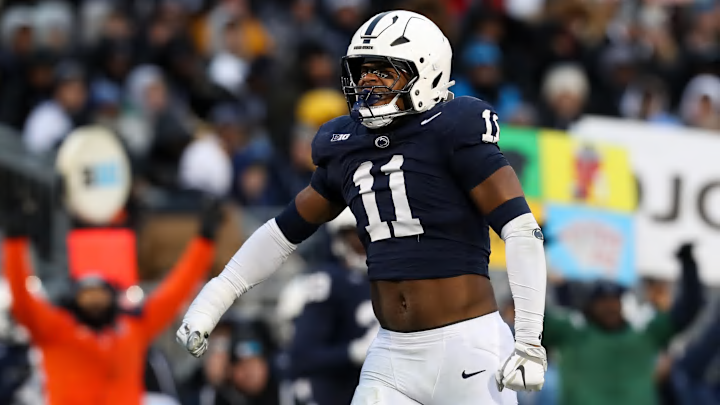Penn State defensive end Abdul Carter was the only player named a finalist for both the Chuck Bedarnik Award and Bronco Nagurski Trophy, the two national Defensive Player of the Year awards in college football. Yet, lost out on the Nagurski to South Carolina defensive end Kyle Kennard in a confounding decision.
Kennard led the SEC with 11.5 sacks, the fifth-most in the nation and 1.5 more than Carter, however, that’s the only pass-rushing department where he has an edge on Penn State’s superstar. You could realistically make an argument that Kennard isn’t even the best pass rusher on his own team.
Freshman Dylan Stewart led the Gamecocks in total quarterback pressures with 48 and pass-rush win rate at 16.2%. However, Stewart racked up 6.5 sacks, and oftentimes defensive awards can be distilled down to the slimmest of margins in the most reductive stats, so Kennard received the attention at South Carolina and Carter lost out on the Nagurski Trophy.
2024 | Abdul Carter | Kyle Kennard |
|---|---|---|
Pass-rush snaps | 287 | 311 |
Sacks | 10 (12th) | 11.5 (5th) |
QB pressures | 51 (10th) | 36 (40th) |
Pass-rush win rate | 21.7% (3rd) | 12.7% (72nd) |
Pass-rush win rate (on true pass sets) | 34.5% (4th) | 18.5% (90th) |
As a pass-rusher, sacks are far from the end-all-be-all. They're hardly predictive of how consistently disruptive a player is along the defensive line. If there's a significant delta in sacks, yes the player with more should be recognized, but pressures are incredibly impactful to an opponent's passing game, and win-rate shows the consistency that a pass-rusher can beat his matchup to get into the backfield, speeding up the quarterbacks's process and forcing an offensive coordinator to allocate additional resources to slow them down.
And those numbers are simply as pass-rushers. Carter was also a more impactful player against the run, finishing the year with 19.5 tackles for loss to Kennard’s 15.5. In terms of total tackles, Carter, the much more versatile player with his background as an off-ball linebacker, had 60 to Kennard’s 28.
There’s no question that Carter is the better and more impactful defensive player, but there are likely two unfair reasons that Kennard took home the hardware. First, Kennard simply had more sacks and many of the voters for the award don’t look beyond that basic and potentially misleading stat. Second, South Carolina missed out on the 12-team College Football Playoff with three losses, despite finishing the year as one of the hottest and most exciting teams in the country. There are undoubtedly voters who simply wanted that Gamecocks team to be recognized for its special season, the program’s best in recent memory. However, making decisions that way can be damaging to the history of the sport.
These national awards are how many will remember the season and the players that truly mattered in it. Kennard deserved to be a finalist, he was a dominant force along a fantastic South Carolina defensive line, but there wasn’t a better defensive player than Abdul Carter, and that could be forgotten if he also missed out on the Bednarik.
When the news was released on Monday night, Carter, the Big Ten Defensive Player of the Year, took to social media to react.
Bet, I gotta go harder
— Abdul Carter (@1NCRDB1) December 10, 2024
The problem for Carter is that, if he doesn't win the Bednarik, he won't have another chance at those national awards. The junior, who has played just one season at defensive end, is projected to be a top-five pick in the 2025 NFL Draft.
